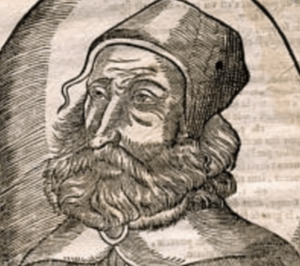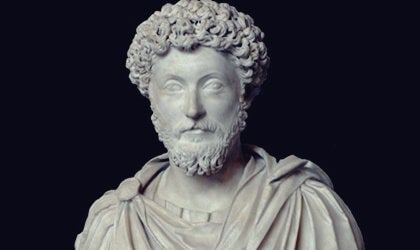A Biography of Galen of Pergamon - A Brilliant Doctor

The name Galen of Pergamon is so closely linked to the history of medicine that, nowadays, all doctors, in some way, use his teachings. After Hippocrates, he’s considered the most famous representative of the health field in ancient times. His contributions were decisive for the medical sciences back then, and are still recognized today.
Galen’s concepts guided medicine for more than a thousand years. His studies on the human body laid the foundations for understanding the whole human anatomy. Among his many contributions, he discovered that air didn’t circulate through the veins but rather blood did.
He also made some significant discoveries regarding heart valves, the functions of the kidneys and the bladder, and some basic notions of the brain.
Galen was also one of the first to witness and describe an epidemic. He was a first-hand witness of the Antonine Plague, also known as “Galen’s Plague”. It divided the history of the ancient world in two and, although doctors never fully understood it, they left us some important information about it.

Galen of Pergamon, the predestined one?
Galen was born in 129 or 130 A.D. in Pergamon (hence his name), a city then under Greek rule and now part of Turkey. This physician was born into an aristocratic and wealthy family. His father was Aelius Nicon, a prosperous architect and landowner. Little is known about his mother, except that she had a difficult temperament.
Galen’s parents were concerned that their son should have a good, solid education. Legend has it that his father dreamed one night of Asclepius, the god of medicine. In that dream, the god himself told him that his son should study medicine. Whether because of this, or some other reason, his father encouraged him to follow that profession.
Initially, Galen studied at the Aesculapian of Pergamum, which was something like a healing temple. There, he combined the medical knowledge of the time with religious beliefs. Later, the future physician went to study in Smyrna and Corinth, where he became familiar with the work of Hippocrates, which significantly influenced his training.
An outstanding physician
Later, Galen went to Alexandria, which was the true Mecca of knowledge back then. There, he completed his training, mainly in anatomy and physiology. In that metropolis, he was able to dissect corpses, and this enabled him to understand the functioning of the human body a lot better.
He returned to his hometown when his father died. There, he became a doctor of the gladiatorial school and this allowed him to become familiar with blows and wounds. He worked there for about four years, while his reputation as an effective healer grew.
In 162, he went to live in Rome, the “capital of the world” at that time. His prestige grew, to the point that he became the personal physician of several emperors such as Marcus Aurelius, Commodus, and Septimius Severus. His stay in Rome allowed him to give free rein to his ability as a researcher. Experts believe that, during this period, he wrote about 400 works, of which only 150 have been preserved.

A definitive imprint
In Rome, dissections were forbidden, so Galen had to conduct his research on animals, sometimes alive, sometimes dead. This made it possible for him to understand the basic functioning of the kidneys and the spinal cord. Unfortunately, a lot of his work was burned in a fire in 171.
His main work was On the Art of Healing, a treatise that was in full force for 15 centuries. The work of this physician is also considered the essential basis of pharmacopeia. One of his great virtues is that he was a consecrated experimenter. In other words, he was a man of science who sought evidence first and then built knowledge around it.
Galen of Pergamon was also convinced that medical knowledge couldn’t be sought or exercised if it wasn’t accompanied by deep ethics. He believed that medicine was, above all, a philanthropic art. He believed that a physician should be virtuous and disciplined, and that, above all, he should be characterized by temperance.
Before his death, this famous physician returned to his homeland, Pergamon, where he died around the year 216.
Surely, without Galen, neither medicine nor pharmaceutical chemistry would have advanced so rapidly in their knowledge and practice.
The name Galen of Pergamon is so closely linked to the history of medicine that, nowadays, all doctors, in some way, use his teachings. After Hippocrates, he’s considered the most famous representative of the health field in ancient times. His contributions were decisive for the medical sciences back then, and are still recognized today.
Galen’s concepts guided medicine for more than a thousand years. His studies on the human body laid the foundations for understanding the whole human anatomy. Among his many contributions, he discovered that air didn’t circulate through the veins but rather blood did.
He also made some significant discoveries regarding heart valves, the functions of the kidneys and the bladder, and some basic notions of the brain.
Galen was also one of the first to witness and describe an epidemic. He was a first-hand witness of the Antonine Plague, also known as “Galen’s Plague”. It divided the history of the ancient world in two and, although doctors never fully understood it, they left us some important information about it.

Galen of Pergamon, the predestined one?
Galen was born in 129 or 130 A.D. in Pergamon (hence his name), a city then under Greek rule and now part of Turkey. This physician was born into an aristocratic and wealthy family. His father was Aelius Nicon, a prosperous architect and landowner. Little is known about his mother, except that she had a difficult temperament.
Galen’s parents were concerned that their son should have a good, solid education. Legend has it that his father dreamed one night of Asclepius, the god of medicine. In that dream, the god himself told him that his son should study medicine. Whether because of this, or some other reason, his father encouraged him to follow that profession.
Initially, Galen studied at the Aesculapian of Pergamum, which was something like a healing temple. There, he combined the medical knowledge of the time with religious beliefs. Later, the future physician went to study in Smyrna and Corinth, where he became familiar with the work of Hippocrates, which significantly influenced his training.
An outstanding physician
Later, Galen went to Alexandria, which was the true Mecca of knowledge back then. There, he completed his training, mainly in anatomy and physiology. In that metropolis, he was able to dissect corpses, and this enabled him to understand the functioning of the human body a lot better.
He returned to his hometown when his father died. There, he became a doctor of the gladiatorial school and this allowed him to become familiar with blows and wounds. He worked there for about four years, while his reputation as an effective healer grew.
In 162, he went to live in Rome, the “capital of the world” at that time. His prestige grew, to the point that he became the personal physician of several emperors such as Marcus Aurelius, Commodus, and Septimius Severus. His stay in Rome allowed him to give free rein to his ability as a researcher. Experts believe that, during this period, he wrote about 400 works, of which only 150 have been preserved.

A definitive imprint
In Rome, dissections were forbidden, so Galen had to conduct his research on animals, sometimes alive, sometimes dead. This made it possible for him to understand the basic functioning of the kidneys and the spinal cord. Unfortunately, a lot of his work was burned in a fire in 171.
His main work was On the Art of Healing, a treatise that was in full force for 15 centuries. The work of this physician is also considered the essential basis of pharmacopeia. One of his great virtues is that he was a consecrated experimenter. In other words, he was a man of science who sought evidence first and then built knowledge around it.
Galen of Pergamon was also convinced that medical knowledge couldn’t be sought or exercised if it wasn’t accompanied by deep ethics. He believed that medicine was, above all, a philanthropic art. He believed that a physician should be virtuous and disciplined, and that, above all, he should be characterized by temperance.
Before his death, this famous physician returned to his homeland, Pergamon, where he died around the year 216.
Surely, without Galen, neither medicine nor pharmaceutical chemistry would have advanced so rapidly in their knowledge and practice.
All cited sources were thoroughly reviewed by our team to ensure their quality, reliability, currency, and validity. The bibliography of this article was considered reliable and of academic or scientific accuracy.
Rodríguez, R. M. M., & Ballester, L. G. (1982). El dolor en la teoría y práctica médicas de Galeno. Dynamis: Acta Hispanica ad Medicinae Scientiarumque Historiam Illustrandam, 2, 3-24.
This text is provided for informational purposes only and does not replace consultation with a professional. If in doubt, consult your specialist.







